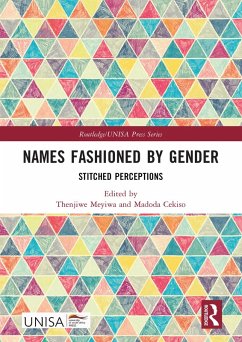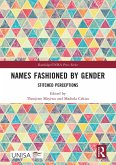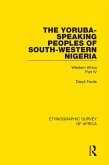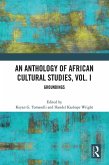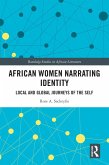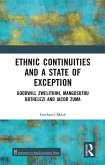Names Fashioned by Gender (eBook, PDF)
Stitched Perceptions
Redaktion: Meyiwa, Thenjiwe; Cekiso, Madoda
42,95 €
42,95 €
inkl. MwSt.
Sofort per Download lieferbar

21 °P sammeln
42,95 €
Als Download kaufen

42,95 €
inkl. MwSt.
Sofort per Download lieferbar

21 °P sammeln
Jetzt verschenken
Alle Infos zum eBook verschenken
42,95 €
inkl. MwSt.
Sofort per Download lieferbar
Alle Infos zum eBook verschenken

21 °P sammeln
Names Fashioned by Gender (eBook, PDF)
Stitched Perceptions
Redaktion: Meyiwa, Thenjiwe; Cekiso, Madoda
- Format: PDF
- Merkliste
- Auf die Merkliste
- Bewerten Bewerten
- Teilen
- Produkt teilen
- Produkterinnerung
- Produkterinnerung

Bitte loggen Sie sich zunächst in Ihr Kundenkonto ein oder registrieren Sie sich bei
bücher.de, um das eBook-Abo tolino select nutzen zu können.
Hier können Sie sich einloggen
Hier können Sie sich einloggen
Sie sind bereits eingeloggt. Klicken Sie auf 2. tolino select Abo, um fortzufahren.

Bitte loggen Sie sich zunächst in Ihr Kundenkonto ein oder registrieren Sie sich bei bücher.de, um das eBook-Abo tolino select nutzen zu können.
Names Fashioned by Gender is a collection of essays on onomastics-a linguistics field of study focusing on the origin, form, history and use of proper names in African societies.
- Geräte: PC
- mit Kopierschutz
- eBook Hilfe
Andere Kunden interessierten sich auch für
![Names Fashioned by Gender (eBook, ePUB) Names Fashioned by Gender (eBook, ePUB)]() Names Fashioned by Gender (eBook, ePUB)42,95 €
Names Fashioned by Gender (eBook, ePUB)42,95 €![The Yoruba-Speaking Peoples of South-Western Nigeria (eBook, PDF) The Yoruba-Speaking Peoples of South-Western Nigeria (eBook, PDF)]() Daryll FordeThe Yoruba-Speaking Peoples of South-Western Nigeria (eBook, PDF)39,95 €
Daryll FordeThe Yoruba-Speaking Peoples of South-Western Nigeria (eBook, PDF)39,95 €![An Anthology of African Cultural Studies, Volume I (eBook, PDF) An Anthology of African Cultural Studies, Volume I (eBook, PDF)]() An Anthology of African Cultural Studies, Volume I (eBook, PDF)52,95 €
An Anthology of African Cultural Studies, Volume I (eBook, PDF)52,95 €![African Women Narrating Identity (eBook, PDF) African Women Narrating Identity (eBook, PDF)]() Rose A. SackeyfioAfrican Women Narrating Identity (eBook, PDF)42,95 €
Rose A. SackeyfioAfrican Women Narrating Identity (eBook, PDF)42,95 €![Finding My Way (eBook, PDF) Finding My Way (eBook, PDF)]() Duncan BrownFinding My Way (eBook, PDF)42,95 €
Duncan BrownFinding My Way (eBook, PDF)42,95 €![Afropolitanism: Reboot (eBook, PDF) Afropolitanism: Reboot (eBook, PDF)]() Afropolitanism: Reboot (eBook, PDF)46,95 €
Afropolitanism: Reboot (eBook, PDF)46,95 €![Ethnic Continuities and a State of Exception (eBook, PDF) Ethnic Continuities and a State of Exception (eBook, PDF)]() Gerhard MaréEthnic Continuities and a State of Exception (eBook, PDF)42,95 €
Gerhard MaréEthnic Continuities and a State of Exception (eBook, PDF)42,95 €-
-
-
Names Fashioned by Gender is a collection of essays on onomastics-a linguistics field of study focusing on the origin, form, history and use of proper names in African societies.
Dieser Download kann aus rechtlichen Gründen nur mit Rechnungsadresse in A, B, BG, CY, CZ, D, DK, EW, E, FIN, F, GR, HR, H, IRL, I, LT, L, LR, M, NL, PL, P, R, S, SLO, SK ausgeliefert werden.
Produktdetails
- Produktdetails
- Verlag: Taylor & Francis eBooks
- Seitenzahl: 369
- Erscheinungstermin: 1. Dezember 2023
- Englisch
- ISBN-13: 9781003812807
- Artikelnr.: 69058762
- Verlag: Taylor & Francis eBooks
- Seitenzahl: 369
- Erscheinungstermin: 1. Dezember 2023
- Englisch
- ISBN-13: 9781003812807
- Artikelnr.: 69058762
- Herstellerkennzeichnung Die Herstellerinformationen sind derzeit nicht verfügbar.
Thenjiwe Meyiwa, a feminist scholar, is the lead editor of this book. She is Deputy Vice-chancellor for Research, Innovation, Commercialisation and Postgraduate Studies at Unisa. She is a member of various parastatals, community and civil society organisations, such as the Rural Women's Movement where she is the Advisory Board member; the South African National Heraldry Council where she serves as its Chairperson and a Deputy Chair of the National Heritage Council; to name but a few. She has authored several research gender studies articles, including co-publishing five books. Madoda Cekiso, the co-editor of this book, is senior professor at Tshwane University of Technology's Department of English. He has published widely in the field of reading and writing with a significant number of his recent research projects and publications focusing on the gender analysis within this subject field.
Acknowledgements
Foreword
Preface
Introduction: Towards developing feminist onomastics scholarship
Thenjiwe Meyiwa and Madoda Cekiso
Chapter 1: Assessing the origin and perceptions of gendered Yoruba names
Temitope O. Adekunle
Chapter 2: Gendered personal names in Yoruba and Chichewa
Alfred Jana Matiki and Modupe M. Alimi
Chapter 3: Setswana naming system: a gendered outlook
Goabilwe N. Ramaeba and Joyce T. Mathangwane
Chapter 4: Gender stereotypes embedded in the labels of female subjects in
a cross section of Zimbabwean music
Duren Jhamba
Chapter 5: Child naming and gender transformation in Gutu, Zimbabwe
Christopher Rwodzi
Chapter 6: Beyond the name: Maniangas tribe ways of naming
Luvisa Bibiche Bazola
Chapter 7: Subculture socio-cultural nicknaming phenomena embedded in
izindlavini of amaMpondo of the Eastern Cape
Thenjiwe Meyiwa and Madoda Cekiso
Chapter 8: Re-considering the idiom 'If God is male, then the male is God'
in light of selected Shona personal names among Reformed Church in Zimbabwe
Christians in Chivi, Zimbabwe
Excellent Chireshe
Chapter 9: Gender in the personal naming practices of the Shona in
Zimbabwe: a socio-onomastic study
Zvinashe Mamvura and Margret Chipara
Chapter 10: Xhosa female initiates' (intonjane) perceptions of meanings and
values attached to their new names
Khanyisile Rose Masha and Ilse du Toit
Chapter 11: 'Get this straight, that is (not) my name', retorts a Xhosa
woman
Nolutho Diko
Chapter 12: 'Hold the roof woman': exploring how the naming practices
amongst isiXhosa speaking people contribute to a high divorce rate in South
Africa
Nosisi Feza
Chapter 13: A feminist approach to the naming and circumstances of women in
the Bible in relation to the naming of prominent Zulu women
Nobuhle Ndimande-Hlongwa and Thandi Mwelase
Chapter 14: An examination of names and gender in Ngugi's Devil on the
cross and I will marry when I want
Cheela Chilala
Chapter 15: Gender shift in the use of the formative -no- in Zulu given
names
Adrian Koopman
Chapter 16: Fluid identities: naming and recognition in NoViolet Bulawayo's
We need new names and Chimamanda Ngozi Adichie's Americanah
Ken Junior Lipenga
Chapter 17: Queer(ing) onomastics: names and the construction of
non-normative genders and sexualities in selected short stories in Queer
Africa: New and collected fiction
Gibson Ncube
Chapter 18: A feminist interrogation of Owé gendered naming practices
Josephine Olufunmilayo Alexander
Chapter 19: The gendered nature of naming children among the Shona in
Zimbabwe
Vimbai Matiza-Mtombeni
Chapter 20: Names of council beer halls and shebeens in Bulawayo: A
feminist analysis
Liketso Dube and Sambulo Ndlovu
Chapter 21: Anti-women nomenclature: a selection of Zimbabwean ergonyms in
family businesses
Sambulo Ndlovu
Chapter 22: Interrogating the female politicians selected motherhood and
wifehood label in the Zimbabwean print media: The case of the Financial
Gazette 2002
Mandiedza Parichi
Chapter 23: Rethinking the framing of women in the nation through
'self-naming' and 'self-definition' of female nationalists in Zimbabwe
Phillip Mpofu and Charles Tembo
Chapter 24: Naming female characters to achieve a colonial agenda
('de-womanisation' of African womanhood): The case of Zvarevashe's novel
Kurauone
Tyanai Charamba
Foreword
Preface
Introduction: Towards developing feminist onomastics scholarship
Thenjiwe Meyiwa and Madoda Cekiso
Chapter 1: Assessing the origin and perceptions of gendered Yoruba names
Temitope O. Adekunle
Chapter 2: Gendered personal names in Yoruba and Chichewa
Alfred Jana Matiki and Modupe M. Alimi
Chapter 3: Setswana naming system: a gendered outlook
Goabilwe N. Ramaeba and Joyce T. Mathangwane
Chapter 4: Gender stereotypes embedded in the labels of female subjects in
a cross section of Zimbabwean music
Duren Jhamba
Chapter 5: Child naming and gender transformation in Gutu, Zimbabwe
Christopher Rwodzi
Chapter 6: Beyond the name: Maniangas tribe ways of naming
Luvisa Bibiche Bazola
Chapter 7: Subculture socio-cultural nicknaming phenomena embedded in
izindlavini of amaMpondo of the Eastern Cape
Thenjiwe Meyiwa and Madoda Cekiso
Chapter 8: Re-considering the idiom 'If God is male, then the male is God'
in light of selected Shona personal names among Reformed Church in Zimbabwe
Christians in Chivi, Zimbabwe
Excellent Chireshe
Chapter 9: Gender in the personal naming practices of the Shona in
Zimbabwe: a socio-onomastic study
Zvinashe Mamvura and Margret Chipara
Chapter 10: Xhosa female initiates' (intonjane) perceptions of meanings and
values attached to their new names
Khanyisile Rose Masha and Ilse du Toit
Chapter 11: 'Get this straight, that is (not) my name', retorts a Xhosa
woman
Nolutho Diko
Chapter 12: 'Hold the roof woman': exploring how the naming practices
amongst isiXhosa speaking people contribute to a high divorce rate in South
Africa
Nosisi Feza
Chapter 13: A feminist approach to the naming and circumstances of women in
the Bible in relation to the naming of prominent Zulu women
Nobuhle Ndimande-Hlongwa and Thandi Mwelase
Chapter 14: An examination of names and gender in Ngugi's Devil on the
cross and I will marry when I want
Cheela Chilala
Chapter 15: Gender shift in the use of the formative -no- in Zulu given
names
Adrian Koopman
Chapter 16: Fluid identities: naming and recognition in NoViolet Bulawayo's
We need new names and Chimamanda Ngozi Adichie's Americanah
Ken Junior Lipenga
Chapter 17: Queer(ing) onomastics: names and the construction of
non-normative genders and sexualities in selected short stories in Queer
Africa: New and collected fiction
Gibson Ncube
Chapter 18: A feminist interrogation of Owé gendered naming practices
Josephine Olufunmilayo Alexander
Chapter 19: The gendered nature of naming children among the Shona in
Zimbabwe
Vimbai Matiza-Mtombeni
Chapter 20: Names of council beer halls and shebeens in Bulawayo: A
feminist analysis
Liketso Dube and Sambulo Ndlovu
Chapter 21: Anti-women nomenclature: a selection of Zimbabwean ergonyms in
family businesses
Sambulo Ndlovu
Chapter 22: Interrogating the female politicians selected motherhood and
wifehood label in the Zimbabwean print media: The case of the Financial
Gazette 2002
Mandiedza Parichi
Chapter 23: Rethinking the framing of women in the nation through
'self-naming' and 'self-definition' of female nationalists in Zimbabwe
Phillip Mpofu and Charles Tembo
Chapter 24: Naming female characters to achieve a colonial agenda
('de-womanisation' of African womanhood): The case of Zvarevashe's novel
Kurauone
Tyanai Charamba
Acknowledgements
Foreword
Preface
Introduction: Towards developing feminist onomastics scholarship
Thenjiwe Meyiwa and Madoda Cekiso
Chapter 1: Assessing the origin and perceptions of gendered Yoruba names
Temitope O. Adekunle
Chapter 2: Gendered personal names in Yoruba and Chichewa
Alfred Jana Matiki and Modupe M. Alimi
Chapter 3: Setswana naming system: a gendered outlook
Goabilwe N. Ramaeba and Joyce T. Mathangwane
Chapter 4: Gender stereotypes embedded in the labels of female subjects in
a cross section of Zimbabwean music
Duren Jhamba
Chapter 5: Child naming and gender transformation in Gutu, Zimbabwe
Christopher Rwodzi
Chapter 6: Beyond the name: Maniangas tribe ways of naming
Luvisa Bibiche Bazola
Chapter 7: Subculture socio-cultural nicknaming phenomena embedded in
izindlavini of amaMpondo of the Eastern Cape
Thenjiwe Meyiwa and Madoda Cekiso
Chapter 8: Re-considering the idiom 'If God is male, then the male is God'
in light of selected Shona personal names among Reformed Church in Zimbabwe
Christians in Chivi, Zimbabwe
Excellent Chireshe
Chapter 9: Gender in the personal naming practices of the Shona in
Zimbabwe: a socio-onomastic study
Zvinashe Mamvura and Margret Chipara
Chapter 10: Xhosa female initiates' (intonjane) perceptions of meanings and
values attached to their new names
Khanyisile Rose Masha and Ilse du Toit
Chapter 11: 'Get this straight, that is (not) my name', retorts a Xhosa
woman
Nolutho Diko
Chapter 12: 'Hold the roof woman': exploring how the naming practices
amongst isiXhosa speaking people contribute to a high divorce rate in South
Africa
Nosisi Feza
Chapter 13: A feminist approach to the naming and circumstances of women in
the Bible in relation to the naming of prominent Zulu women
Nobuhle Ndimande-Hlongwa and Thandi Mwelase
Chapter 14: An examination of names and gender in Ngugi's Devil on the
cross and I will marry when I want
Cheela Chilala
Chapter 15: Gender shift in the use of the formative -no- in Zulu given
names
Adrian Koopman
Chapter 16: Fluid identities: naming and recognition in NoViolet Bulawayo's
We need new names and Chimamanda Ngozi Adichie's Americanah
Ken Junior Lipenga
Chapter 17: Queer(ing) onomastics: names and the construction of
non-normative genders and sexualities in selected short stories in Queer
Africa: New and collected fiction
Gibson Ncube
Chapter 18: A feminist interrogation of Owé gendered naming practices
Josephine Olufunmilayo Alexander
Chapter 19: The gendered nature of naming children among the Shona in
Zimbabwe
Vimbai Matiza-Mtombeni
Chapter 20: Names of council beer halls and shebeens in Bulawayo: A
feminist analysis
Liketso Dube and Sambulo Ndlovu
Chapter 21: Anti-women nomenclature: a selection of Zimbabwean ergonyms in
family businesses
Sambulo Ndlovu
Chapter 22: Interrogating the female politicians selected motherhood and
wifehood label in the Zimbabwean print media: The case of the Financial
Gazette 2002
Mandiedza Parichi
Chapter 23: Rethinking the framing of women in the nation through
'self-naming' and 'self-definition' of female nationalists in Zimbabwe
Phillip Mpofu and Charles Tembo
Chapter 24: Naming female characters to achieve a colonial agenda
('de-womanisation' of African womanhood): The case of Zvarevashe's novel
Kurauone
Tyanai Charamba
Foreword
Preface
Introduction: Towards developing feminist onomastics scholarship
Thenjiwe Meyiwa and Madoda Cekiso
Chapter 1: Assessing the origin and perceptions of gendered Yoruba names
Temitope O. Adekunle
Chapter 2: Gendered personal names in Yoruba and Chichewa
Alfred Jana Matiki and Modupe M. Alimi
Chapter 3: Setswana naming system: a gendered outlook
Goabilwe N. Ramaeba and Joyce T. Mathangwane
Chapter 4: Gender stereotypes embedded in the labels of female subjects in
a cross section of Zimbabwean music
Duren Jhamba
Chapter 5: Child naming and gender transformation in Gutu, Zimbabwe
Christopher Rwodzi
Chapter 6: Beyond the name: Maniangas tribe ways of naming
Luvisa Bibiche Bazola
Chapter 7: Subculture socio-cultural nicknaming phenomena embedded in
izindlavini of amaMpondo of the Eastern Cape
Thenjiwe Meyiwa and Madoda Cekiso
Chapter 8: Re-considering the idiom 'If God is male, then the male is God'
in light of selected Shona personal names among Reformed Church in Zimbabwe
Christians in Chivi, Zimbabwe
Excellent Chireshe
Chapter 9: Gender in the personal naming practices of the Shona in
Zimbabwe: a socio-onomastic study
Zvinashe Mamvura and Margret Chipara
Chapter 10: Xhosa female initiates' (intonjane) perceptions of meanings and
values attached to their new names
Khanyisile Rose Masha and Ilse du Toit
Chapter 11: 'Get this straight, that is (not) my name', retorts a Xhosa
woman
Nolutho Diko
Chapter 12: 'Hold the roof woman': exploring how the naming practices
amongst isiXhosa speaking people contribute to a high divorce rate in South
Africa
Nosisi Feza
Chapter 13: A feminist approach to the naming and circumstances of women in
the Bible in relation to the naming of prominent Zulu women
Nobuhle Ndimande-Hlongwa and Thandi Mwelase
Chapter 14: An examination of names and gender in Ngugi's Devil on the
cross and I will marry when I want
Cheela Chilala
Chapter 15: Gender shift in the use of the formative -no- in Zulu given
names
Adrian Koopman
Chapter 16: Fluid identities: naming and recognition in NoViolet Bulawayo's
We need new names and Chimamanda Ngozi Adichie's Americanah
Ken Junior Lipenga
Chapter 17: Queer(ing) onomastics: names and the construction of
non-normative genders and sexualities in selected short stories in Queer
Africa: New and collected fiction
Gibson Ncube
Chapter 18: A feminist interrogation of Owé gendered naming practices
Josephine Olufunmilayo Alexander
Chapter 19: The gendered nature of naming children among the Shona in
Zimbabwe
Vimbai Matiza-Mtombeni
Chapter 20: Names of council beer halls and shebeens in Bulawayo: A
feminist analysis
Liketso Dube and Sambulo Ndlovu
Chapter 21: Anti-women nomenclature: a selection of Zimbabwean ergonyms in
family businesses
Sambulo Ndlovu
Chapter 22: Interrogating the female politicians selected motherhood and
wifehood label in the Zimbabwean print media: The case of the Financial
Gazette 2002
Mandiedza Parichi
Chapter 23: Rethinking the framing of women in the nation through
'self-naming' and 'self-definition' of female nationalists in Zimbabwe
Phillip Mpofu and Charles Tembo
Chapter 24: Naming female characters to achieve a colonial agenda
('de-womanisation' of African womanhood): The case of Zvarevashe's novel
Kurauone
Tyanai Charamba
